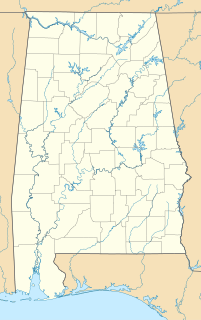
Butler County is a county located in the south central portion of the U.S. state of Alabama. As of the 2010 census, the population was 20,947. Its county seat is Greenville. Its name is in honor of Captain William Butler, who was born in Virginia and fought in the Creek War, and who was killed in May 1818.

Conecuh County is a county located in the south central portion of the U.S. state of Alabama. As of the 2010 census the population was 13,228. Its county seat is Evergreen. Its name is believed to be derived from a Creek Indian term meaning "land of cane."

Covington County, is a county located in the south central portion of the U.S. state of Alabama. As of the 2010 census the population was 37,765. Its county seat is Andalusia. Its name is in honor of Brigadier General Leonard Covington of Maryland and Mississippi, who died in the War of 1812.

Escambia County is a county located in the south central portion of the U.S. state of Alabama. As of the 2010 census, the population was 38,319. Its county seat is Brewton.

Humphreys County is a county located in the U.S. state of Tennessee. As of the 2010 census, the population was 18,538. Its county seat is Waverly.

Union Springs is a city in and county seat of Bullock County, Alabama, United States. The population was 3,980 at the 2010 census.

The Conecuh National Forest in southern Alabama covers 83,000 acres (340 km2), along the Alabama - Florida line in Covington and Escambia counties. Topography is level to moderately sloping, broad ridges with stream terraces and broad floodplains.

Waldwic, also known as the William M. Spencer, III, House, is a historic Carpenter Gothic plantation house and historic district located on the west side of Alabama Highway 69, south of Gallion, Alabama. Built as the main residence and headquarters of a forced-labor farm worked by enslaved people, Waldwic is included in the Plantation Houses of the Alabama Canebrake and Their Associated Outbuildings Multiple Property Submission. The main house and plantation outbuildings were added to the National Register of Historic Places on July 22, 1994.

The Hawthorne House, also known as the Col. J. R. Hawthorne House, is a historic plantation house in Pine Apple, Alabama, USA. The two-story wood-frame house was built in 1854 for Joseph Richard Hawthorne by Ezra Plumb. Joseph Hawthorne was born in 1805 in North Carolina, but the family had relocated to Wilkinson County, Georgia by 1810. Hawthorne moved to Conecuh County, Alabama in the 1830s and finally settled in Pine Apple in the 1850s. He owned several large plantations in Conecuh and Wilcox counties. He died in Pine Apple in 1889. The house was sold out of the family after his death, but was brought back into the family when acquired in 1935 by Gladys Hawthorne Whitaker and her brother, Dr. Julian Hawthorne, a New York physician. They restored the house and it remained in the family until Mrs. Whitaker's death in 1980. The house was recorded by the Historic American Buildings Survey in 1937. It was purchased after the death of Mrs. Whitaker by Dr. Edward Childs of Mobile. The house was added to the Alabama Register of Landmarks and Heritage on November 9, 1992 and to the National Register of Historic Places on March 7, 1985 with the name of Hawtorn House.

The Asa White House, also known as the White-McGiffert House, is a historic house in Eutaw, Alabama, United States. It was built in 1838 by Asa White, one of Greene County's earliest settlers. Eutaw was established on property owned by Asa White. He conveyed 20 acres (8.1 ha) to the newly established county seat in 1838 for the building of a courthouse, civic buildings, and a commercial district. He then sold residential lots to individuals. His house is a two-story frame building. It was built in the Federal style and later altered with the addition of Greek Revival-influenced details. The house was recorded by the Historic American Buildings Survey in 1936. It was added to the National Register of Historic Places as a part of the Antebellum Homes in Eutaw Thematic Resource on April 2, 1982, due to its architectural significance.

The following outline is provided as an overview of and topical guide to the U.S. state of Alabama:
Johnston House may refer to:

This is a list of the National Register of Historic Places listings in Conecuh County, Alabama.

The Asa Johnston Farmhouse is a historic farmhouse in Johnstonville, Conecuh County, Alabama. The one story, spraddle roof dogtrot house was built in 1842 by Ezra Plumb for Asa Johnston.

The Louisville and Nashville Depot is a historic railroad station in Evergreen, Conecuh County, Alabama, United States. It was built by the Louisville & Nashville Railroad in 1907. During the early 19th century, the station served as a gathering place for one of the social occasions of the small town, the meeting of the Sunday afternoon train.

Belleville, also known as Bellville or The Ponds, is an unincorporated community in Conecuh County, Alabama, United States.

Cohassett, also known as Lowell, is an unincorporated community in Conecuh County, Alabama, United States.

Paul, also known as New Providence, is an unincorporated community in Conecuh County, Alabama, United States.

Rabb is an unincorporated community in Conecuh County, Alabama, United States.

Shreve, also known as Rat, is an unincorporated community in Conecuh County, Alabama, United States.

















